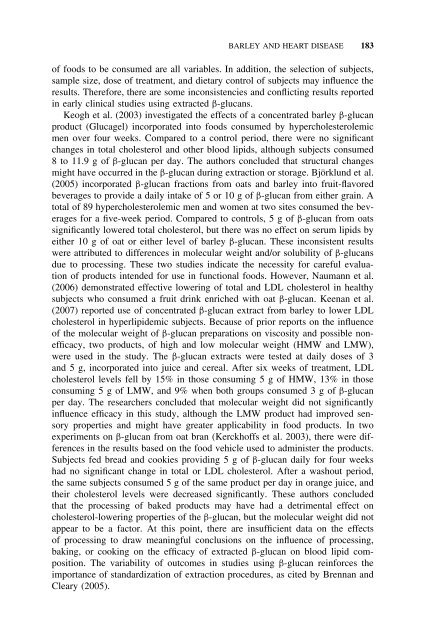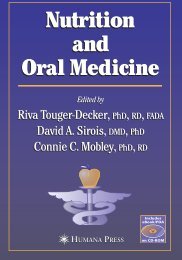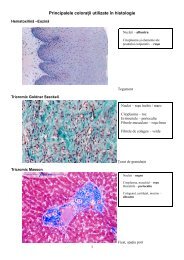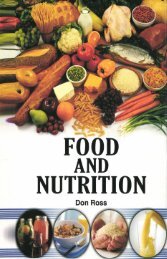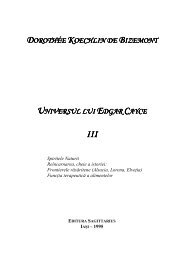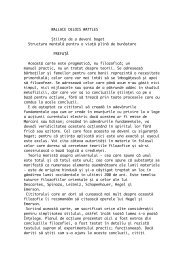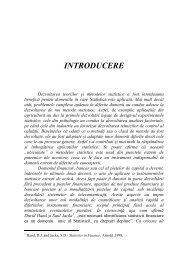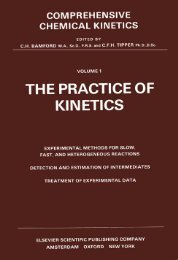Barley for Food and Health: Science, Technology, and Products
Barley for Food and Health: Science, Technology, and Products
Barley for Food and Health: Science, Technology, and Products
You also want an ePaper? Increase the reach of your titles
YUMPU automatically turns print PDFs into web optimized ePapers that Google loves.
BARLEY AND HEART DISEASE 183<br />
of foods to be consumed are all variables. In addition, the selection of subjects,<br />
sample size, dose of treatment, <strong>and</strong> dietary control of subjects may influence the<br />
results. There<strong>for</strong>e, there are some inconsistencies <strong>and</strong> conflicting results reported<br />
in early clinical studies using extracted β-glucans.<br />
Keogh et al. (2003) investigated the effects of a concentrated barley β-glucan<br />
product (Glucagel) incorporated into foods consumed by hypercholesterolemic<br />
men over four weeks. Compared to a control period, there were no significant<br />
changes in total cholesterol <strong>and</strong> other blood lipids, although subjects consumed<br />
8to11.9gofβ-glucan per day. The authors concluded that structural changes<br />
might have occurred in the β-glucan during extraction or storage. Björklund et al.<br />
(2005) incorporated β-glucan fractions from oats <strong>and</strong> barley into fruit-flavored<br />
beverages to provide a daily intake of 5 or 10 g of β-glucan from either grain. A<br />
total of 89 hypercholesterolemic men <strong>and</strong> women at two sites consumed the beverages<br />
<strong>for</strong> a five-week period. Compared to controls, 5 g of β-glucan from oats<br />
significantly lowered total cholesterol, but there was no effect on serum lipids by<br />
either 10 g of oat or either level of barley β-glucan. These inconsistent results<br />
were attributed to differences in molecular weight <strong>and</strong>/or solubility of β-glucans<br />
due to processing. These two studies indicate the necessity <strong>for</strong> careful evaluation<br />
of products intended <strong>for</strong> use in functional foods. However, Naumann et al.<br />
(2006) demonstrated effective lowering of total <strong>and</strong> LDL cholesterol in healthy<br />
subjects who consumed a fruit drink enriched with oat β-glucan. Keenan et al.<br />
(2007) reported use of concentrated β-glucanextractfrombarleytolowerLDL<br />
cholesterol in hyperlipidemic subjects. Because of prior reports on the influence<br />
of the molecular weight of β-glucan preparations on viscosity <strong>and</strong> possible nonefficacy,<br />
two products, of high <strong>and</strong> low molecular weight (HMW <strong>and</strong> LMW),<br />
were used in the study. The β-glucan extracts were tested at daily doses of 3<br />
<strong>and</strong> 5 g, incorporated into juice <strong>and</strong> cereal. After six weeks of treatment, LDL<br />
cholesterol levels fell by 15% in those consuming 5 g of HMW, 13% in those<br />
consuming 5 g of LMW, <strong>and</strong> 9% when both groups consumed 3 g of β-glucan<br />
per day. The researchers concluded that molecular weight did not significantly<br />
influence efficacy in this study, although the LMW product had improved sensory<br />
properties <strong>and</strong> might have greater applicability in food products. In two<br />
experiments on β-glucan from oat bran (Kerckhoffs et al. 2003), there were differences<br />
in the results based on the food vehicle used to administer the products.<br />
Subjects fed bread <strong>and</strong> cookies providing 5 g of β-glucan daily <strong>for</strong> four weeks<br />
had no significant change in total or LDL cholesterol. After a washout period,<br />
thesamesubjectsconsumed5gofthesameproduct per day in orange juice, <strong>and</strong><br />
their cholesterol levels were decreased significantly. These authors concluded<br />
that the processing of baked products may have had a detrimental effect on<br />
cholesterol-lowering properties of the β-glucan, but the molecular weight did not<br />
appear to be a factor. At this point, there are insufficient data on the effects<br />
of processing to draw meaningful conclusions on the influence of processing,<br />
baking, or cooking on the efficacy of extracted β-glucan on blood lipid composition.<br />
The variability of outcomes in studies using β-glucan rein<strong>for</strong>ces the<br />
importance of st<strong>and</strong>ardization of extraction procedures, as cited by Brennan <strong>and</strong><br />
Cleary (2005).


